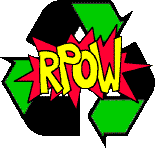 A new kind of currency? RPOW. OK, it is a bit technical: A new kind of currency? RPOW. OK, it is a bit technical:The RPOW system provides for proof of work (POW) tokens to be reused. A POW token is something that takes a relatively long time to compute but which can be checked quickly. RPOW uses hashcash, which are values whose SHA-1 hashes have many high bits of zeros.
Normally POW tokens can't be reused because that would allow them to be double-spent. But RPOW allows for a limited form of reuse: sequential reuse. This lets a POW token be used once, then exchanged for a new one, which can again be used once, then once more exchanged, etc. This approach makes POW tokens more practical for many purposes and allows the effective cost of a POW token to be raised while still allowing systems to use them effectively. One of the uses of that is for spam prevention. If a computer that sends an e-mail has to do a very complicated ("costly", at least in terms of time) operation, and it can be verified that it really happened, it would make it much harder for people who'd want to spew out hundreds of thousand messages an hour to people who don't want them. But for regular e-mail senders, it might not be an issue. And if one can reuse those things, it might be ok if they're relatively harder to come by in the first place, making it even harder for spammers.
OK, when I read the title first, I thought this was a way of certifying that some people did some valuable work for some other people, and that this could be passed around as a currency. That's not what it is. But one could indeeed imagine that this kind of thing could form the basis for something that could be an economy applied to other things. You know, if a penny costs more to manufacture than the value it represents, there's no point in forging one, even if you could. And a hundred billion pennies do add up to real money, which can be reused many times. I suppose this kind of money needs to be adjusted, not for regular inflation, but for Moores Law.
[ Information | 2004-08-19 01:51 | 0 comments | PermaLink ]
|

 A new kind of currency? RPOW. OK, it is a bit technical:
A new kind of currency? RPOW. OK, it is a bit technical: